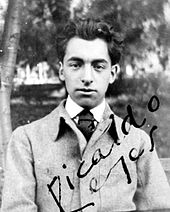The son of a railway worker and teacher, Ricardo Elicer Neftalí Reyes Basoalto (1904–73)
is better known by his pen name, Pablo Neruda, adopted in memory of the
Czech poet Jan Neruda. Basoalto/Neruda was born in Parral, Chile

Neruda went on to hold several
diplomatic posts, traveling to Burma, Ceylon, Java, Singapore, and
finally Madrid, where he was living when the Spanish Civil War broke
out. He supported the Republic and was a committed communist for the
rest of his life. He chronicled the difficult years that followed the
war – including the murder of his friend Federico García Lorca, murdered by Federalist troops in the beginning of the war.

García Lorca in 1914
Neruda returned to Chile in 1952 and spent the last two decades of his life there, integrating public service and advocacy with his work as “the people’s poet”. He was given the Nobel Prize in 1971, “for a poetry that with the action of an elemental force brings alive a continent’s destiny and dreams”.
In "Memory" he laments the detail of life that is demanded of the peot and then explains why he thinks he is ill-suited to the task, but hides in those failures the secret of poetic success:
"...grasped only the intangible
and unrelated things,
which could only be compared
when they no longer existed."
The poem displays why he was popular among the people as it makes poetic sensibilities common among men.
Memory
I have to remember everything,
keep track of blades of grass, threads
of the untidy event, and
the houses, inch by inch,
the long lines of the railway,
the textured face of pain.
If I should get one rosebush wrong
and confuse night with a hare,
or even if one whole wall
has crumbled in my memory,
I have to make the air again,
steam, the earth, leaves,
hair and bricks as well,
the thorns which pierced me,
the speed of the escape.
Take pity on the poet.
I was always quick to forget
and those hands of mine
grasped only the intangible
and unrelated things,
which could only be compared
when they no longer existed.
The smoke was like an aroma,
the aroma was like smoke,
the skin of a sleeping body
which woke to my kisses;
but do not ask me the date
or the name of what I dreamed –
I cannot measure the road
which may have had no country,
or that truth which changed,
which the day perhaps subdued
to become a wandering light
like a firefly in the dark.
PABLO NERUDA
Translated by Alastair Reid (1968)

Neruda as a young man

García Lorca in 1914
Neruda returned to Chile in 1952 and spent the last two decades of his life there, integrating public service and advocacy with his work as “the people’s poet”. He was given the Nobel Prize in 1971, “for a poetry that with the action of an elemental force brings alive a continent’s destiny and dreams”.
In "Memory" he laments the detail of life that is demanded of the peot and then explains why he thinks he is ill-suited to the task, but hides in those failures the secret of poetic success:
"...grasped only the intangible
and unrelated things,
which could only be compared
when they no longer existed."
The poem displays why he was popular among the people as it makes poetic sensibilities common among men.
Memory
I have to remember everything,
keep track of blades of grass, threads
of the untidy event, and
the houses, inch by inch,
the long lines of the railway,
the textured face of pain.
If I should get one rosebush wrong
and confuse night with a hare,
or even if one whole wall
has crumbled in my memory,
I have to make the air again,
steam, the earth, leaves,
hair and bricks as well,
the thorns which pierced me,
the speed of the escape.
Take pity on the poet.
I was always quick to forget
and those hands of mine
grasped only the intangible
and unrelated things,
which could only be compared
when they no longer existed.
The smoke was like an aroma,
the aroma was like smoke,
the skin of a sleeping body
which woke to my kisses;
but do not ask me the date
or the name of what I dreamed –
I cannot measure the road
which may have had no country,
or that truth which changed,
which the day perhaps subdued
to become a wandering light
like a firefly in the dark.
PABLO NERUDA
Translated by Alastair Reid (1968)
No comments:
Post a Comment